

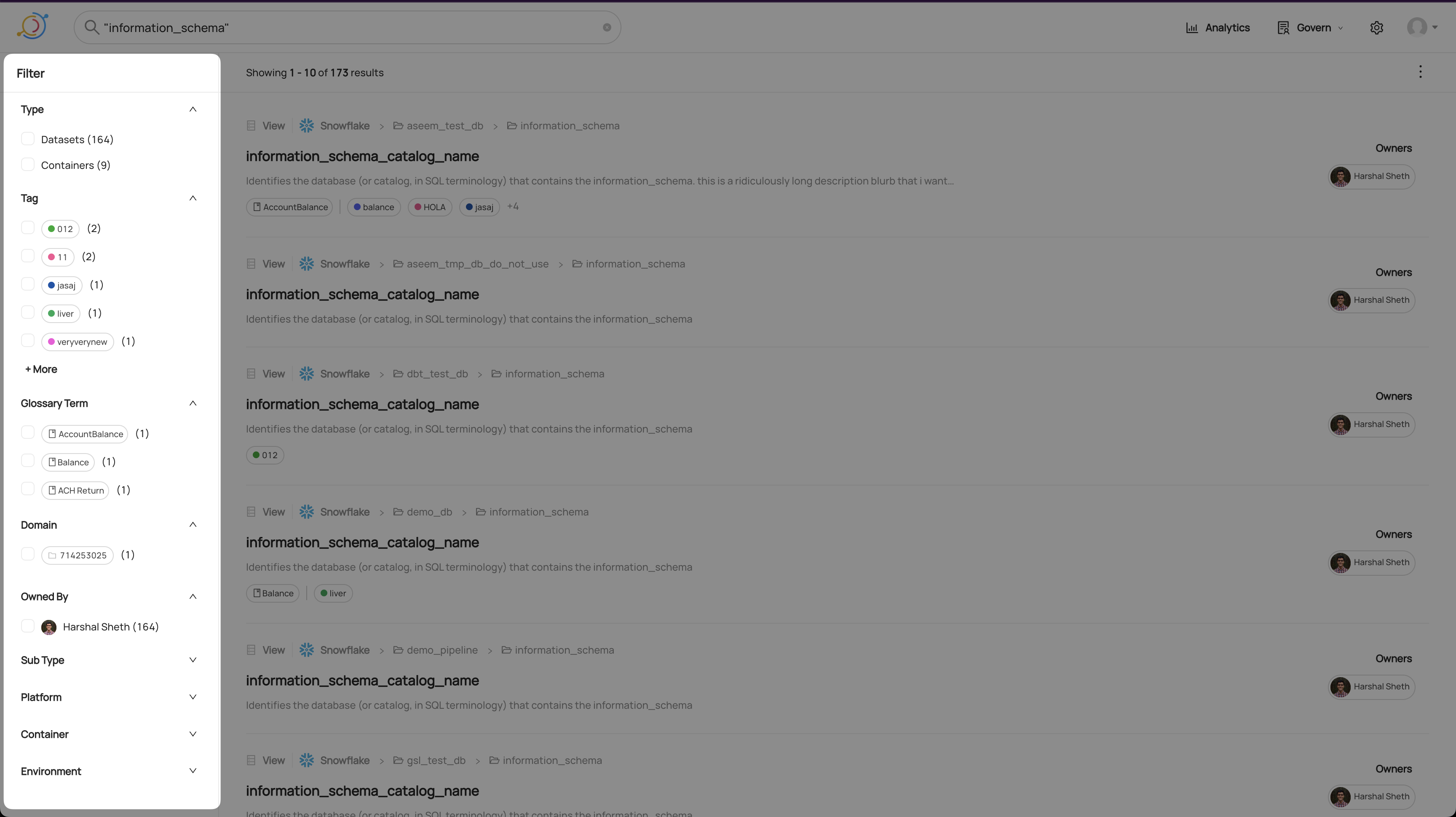
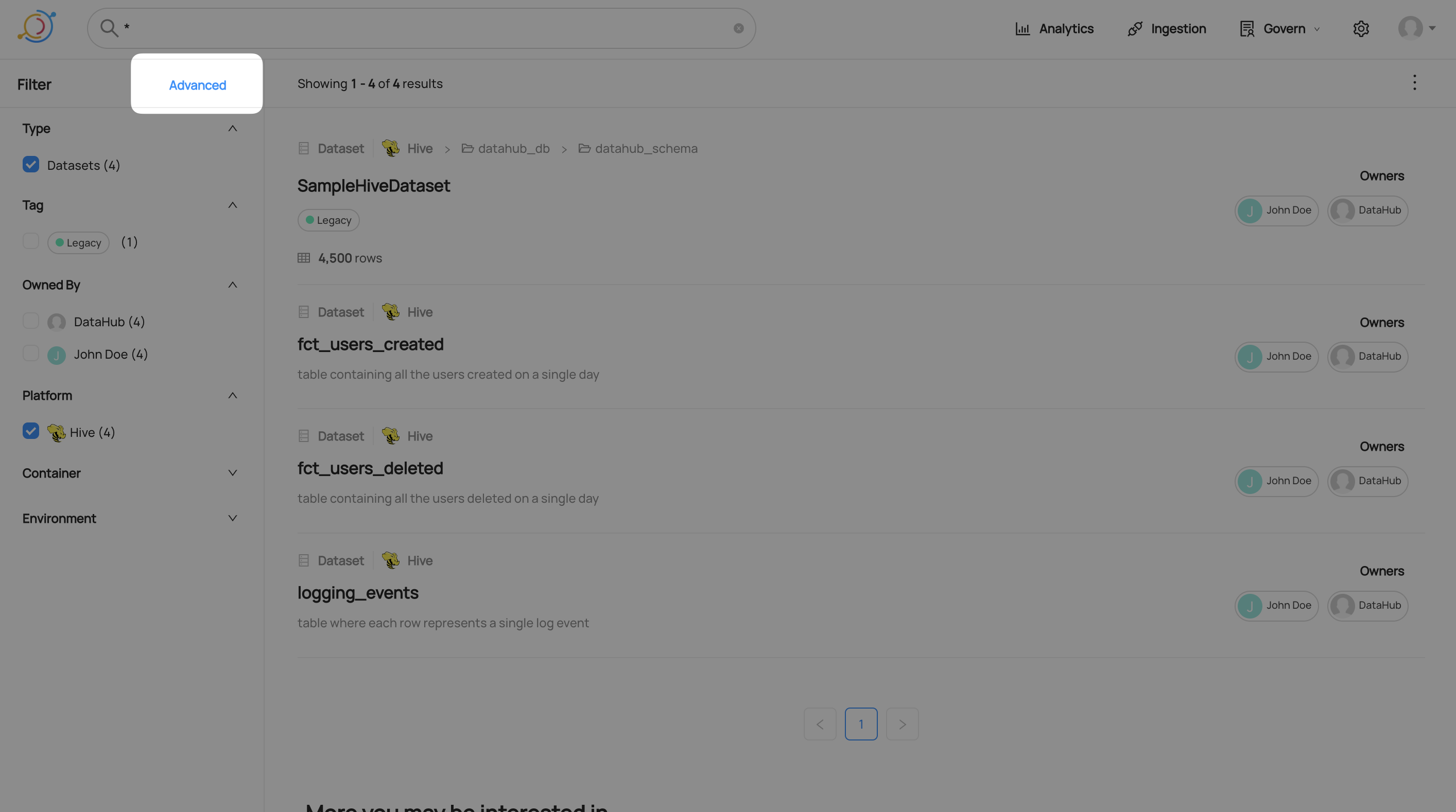
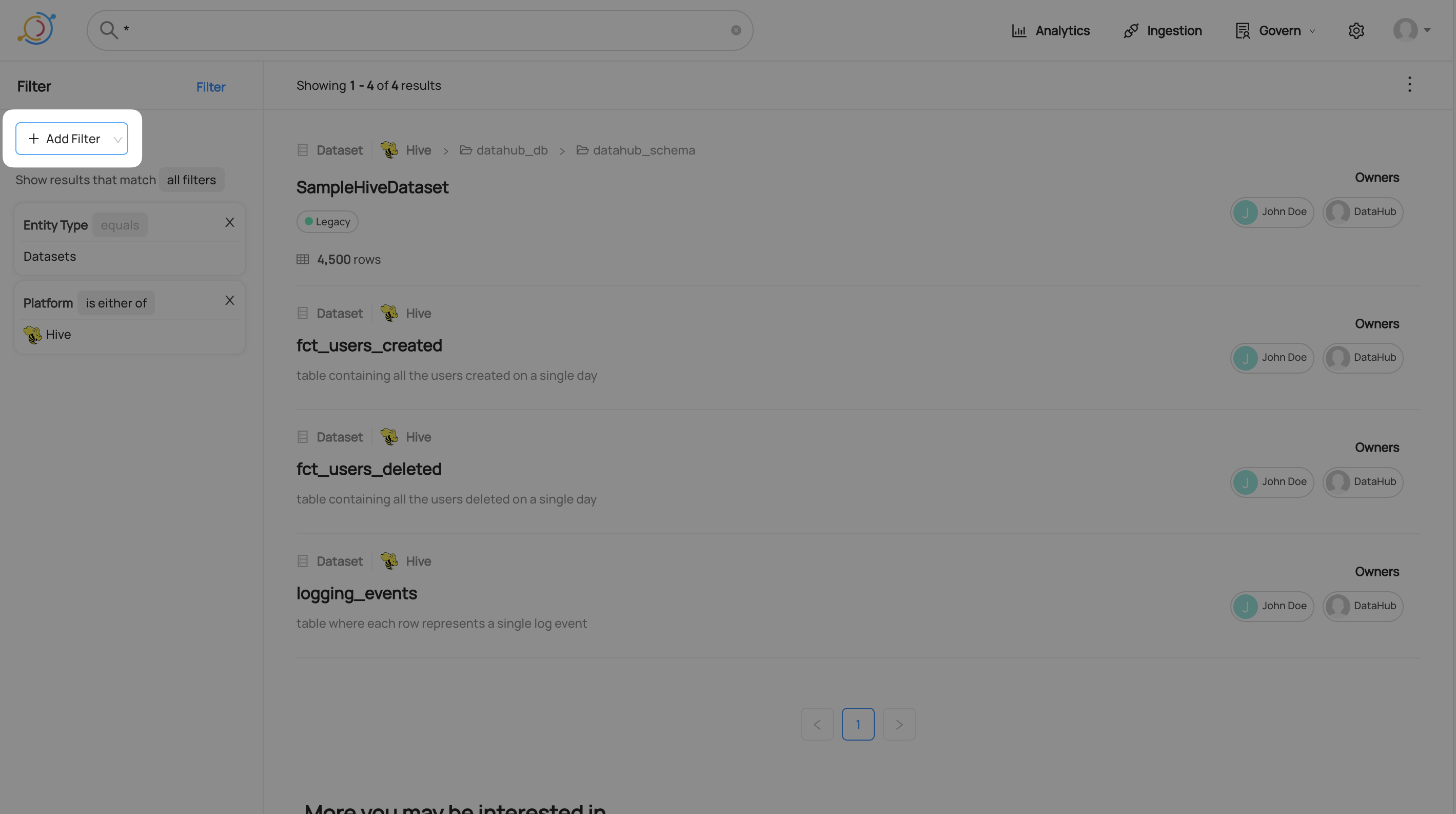
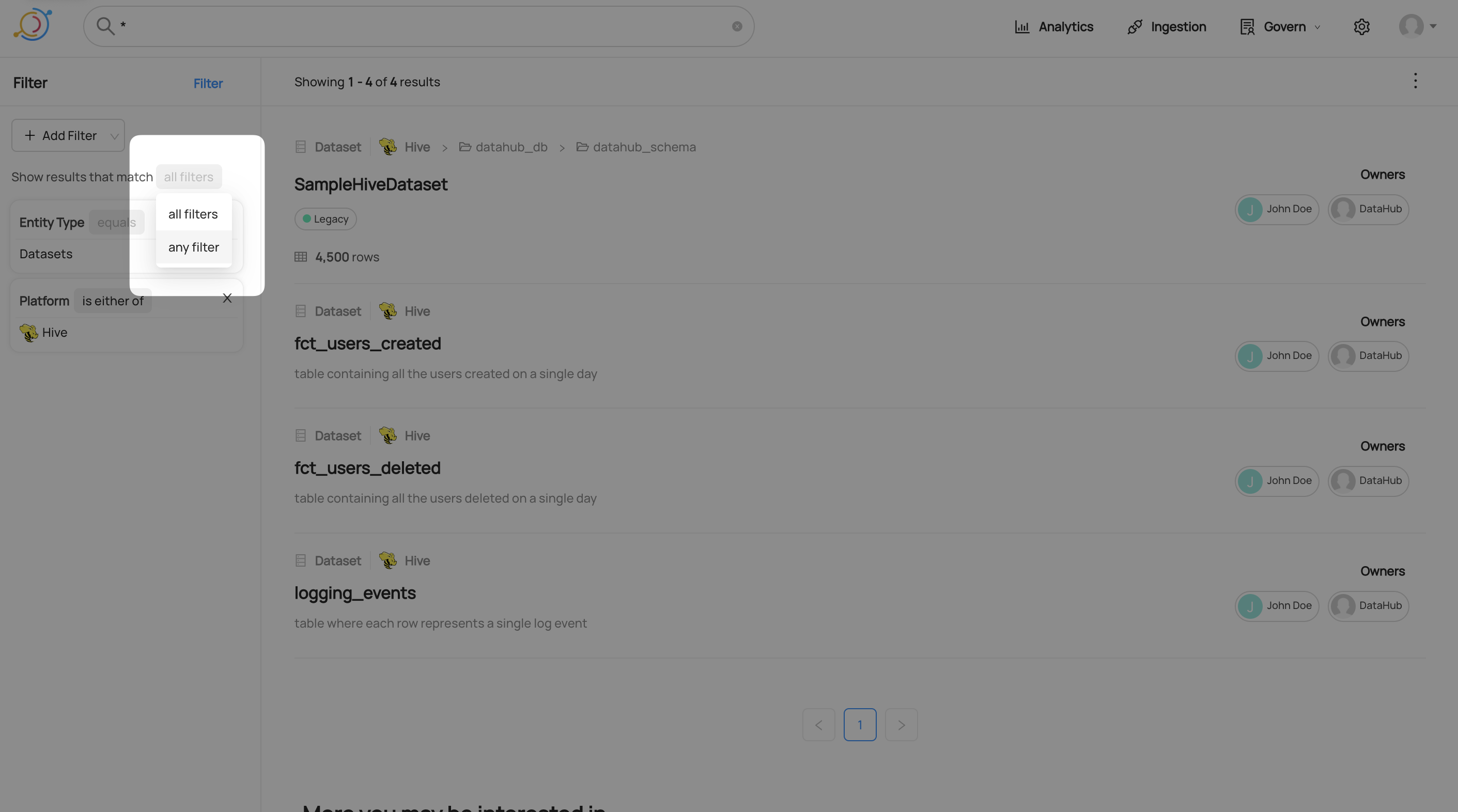
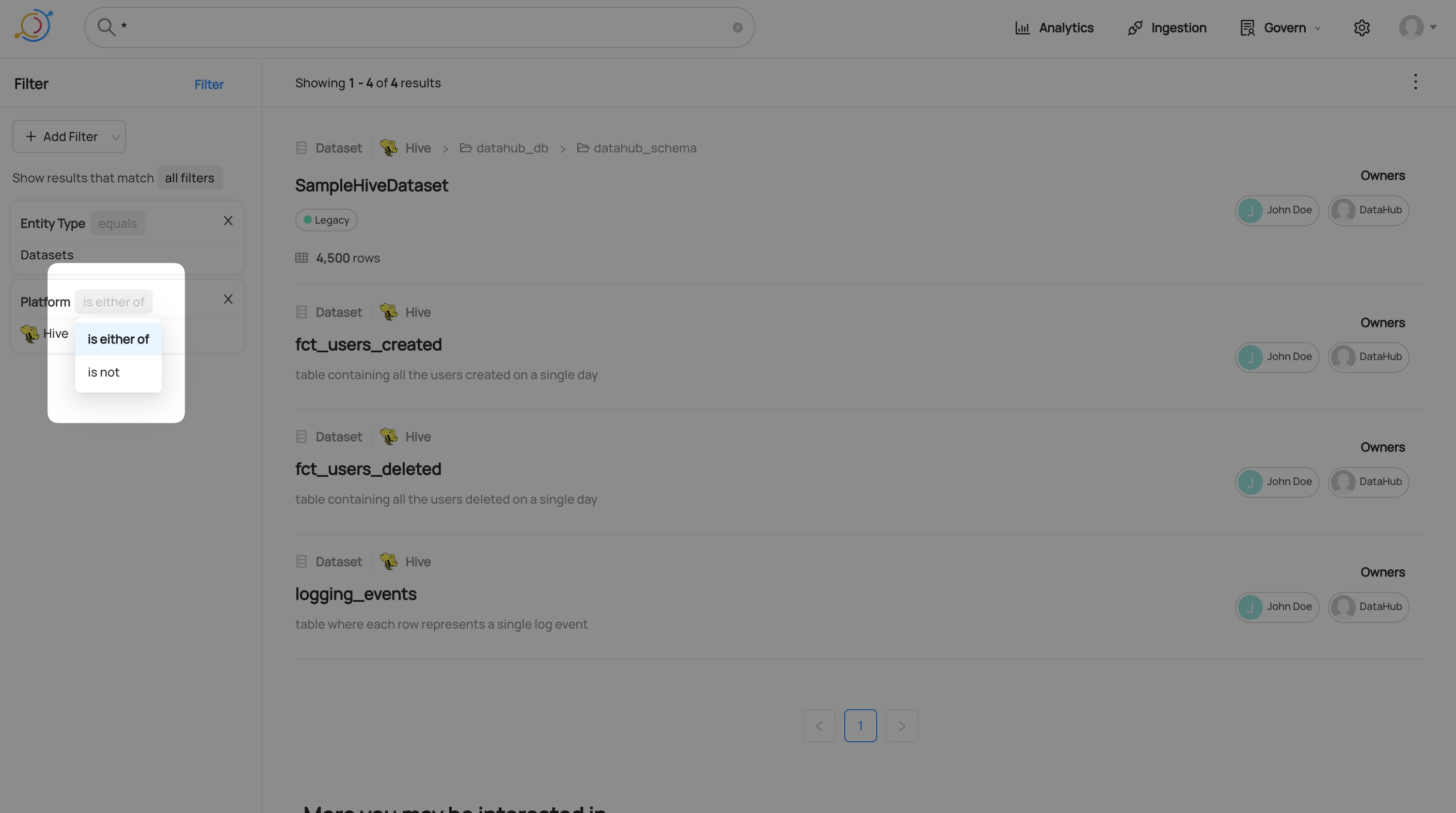
### GraphQL - [searchAcrossEntities](https://docs.datahub.com/docs/graphql/queries/#searchacrossentities) - You can try out the API on the demo instance's public GraphQL interface: [here](https://demo.datahub.com/api/graphiql) The same GraphQL API that powers the Search UI can be used for integrations and programmatic use-cases. ``` # Example query - search for datasets matching the example_query_text who have the Dimension tag applied to a schema field and are from the data platform looker query searchEntities { search( input: { type: DATASET, query: "example_query_text", orFilters: [ { and: [ { field: "fieldTags", values: ["urn:li:tag:Dimension"] }, { field: "platform", values: ["urn:li:dataPlatform:looker"] } ] } ], start: 0, count: 10 } ) { start count total searchResults { entity { urn type ... on Dataset { name platform { name } } } } } } ``` ### Searching at Scale For queries that return more than 10k entities we recommend using the [scrollAcrossEntities](https://docs.datahub.com/docs/graphql/queries/#scrollacrossentities) GraphQL API: ``` # Example query { scrollAcrossEntities(input: { types: [DATASET], query: "*", count: 10}) { nextScrollId count searchResults { entity { type ... on Dataset { urn type platform { name } name } } } } } ``` This will return a response containing a `nextScrollId` value which must be used in subsequent queries to retrieve more data, i.e: ``` { scrollAcrossEntities(input: { types: [DATASET], query: "*", count: 10, scrollId: "eyJzb3J0IjpbMy4wLCJ1cm46bGk6ZGF0YXNldDoodXJuOmxpOmRhdGFQbGF0Zm9ybTpiaWdxdWVyeSxiaWdxdWVyeS1wdWJsaWMtZGF0YS5jb3ZpZDE5X2dlb3RhYl9tb2JpbGl0eV9pbXBhY3QucG9ydF90cmFmZmljLFBST0QpIl0sInBpdElkIjpudWxsLCJleHBpcmF0aW9uVGltZSI6MH0="} ) { nextScrollId count searchResults { entity { type ... on Dataset { urn type platform { name } name } } } } } ``` In order to complete scrolling through all of the results, continue to request data in batches until the `nextScrollId` returned is null or undefined. ### DataHub Blog - [Using DataHub for Search & Discovery](https://medium.com/datahub-project/using-datahub-for-search-discovery-fa309089be22) ## Customizing Search It is possible to completely customize search ranking, filtering, and queries using a search configuration yaml file. This no-code solution provides the ability to extend, or replace, the Elasticsearch-based search functionality. The only limitation is that the information used in the query/ranking/filtering must be present in the entities' document, however this does include `customProperties`, `tags`, `terms`, `domain`, as well as many additional fields. Additionally, multiple customizations can be applied to different query strings. A regex is applied to the search query to determine which customized search profile to use. This means a different query/ranking/filtering can be applied to a `select all`/`*` query or one that contains an actual query. Search results (excluding select `*`) are a balance between relevancy and the scoring function. In general, when trying to improve relevancy, focus on changing the query in the `boolQuery` section and rely on the `functionScore` for surfacing the _importance_ in the case of a relevancy tie. Consider the scenario where a dataset named `orders` exists in multiple places. The relevancy between the dataset with the **name** `orders` and the **term** `orders` is the same, however one location may be more important and thus the function score preferred. **Note:** The customized query is a pass-through to Elasticsearch and must comply with their API, syntax errors are possible. It is recommended to test the customized queries prior to production deployment and knowledge of the Elasticsearch query language is required. ### Enable Custom Search The following environment variables on GMS control whether a search configuration is enabled and the location of the configuration file. Enable Custom Search: ```shell ELASTICSEARCH_QUERY_CUSTOM_CONFIG_ENABLED=true ``` Custom Search File Location: ```shell ELASTICSEARCH_QUERY_CUSTOM_CONFIG_FILE=search_config.yml ``` The location of the configuration file can be on the Java classpath or the local filesystem. A default configuration file is included with the GMS jar with the name `search_config.yml`. ### Search Configuration The search configuration yaml contains a simple list of configuration profiles selected using the `queryRegex`. If a single profile is desired, a catch-all regex of `.*` can be used. The list of search configurations can be grouped into 4 general sections. 1. `queryRegex` - Responsible for selecting the search customization based on the [regex matching](https://www.w3schools.com/java/java_regex.asp) the search query string. _The first match is applied._ 2. Built-in query booleans - There are 3 built-in queries which can be individually enabled/disabled. These include the `simple query string`[[1]](https://www.elastic.co/guide/en/elasticsearch/reference/7.17/query-dsl-simple-query-string-query.html), `match phrase prefix`[[2]](https://www.elastic.co/guide/en/elasticsearch/reference/7.17/query-dsl-match-query-phrase-prefix.html), and `exact match`[[3]](https://www.elastic.co/guide/en/elasticsearch/reference/7.17/query-dsl-term-query.html) queries, enabled with the following booleans respectively [`simpleQuery`, `prefixMatchQuery`, `exactMatchQuery`] 3. `boolQuery` - The base Elasticsearch `boolean query`[[4](https://www.elastic.co/guide/en/elasticsearch/reference/7.17/query-dsl-bool-query.html)]. If enabled in #2 above, those queries will appear in the `should` section of the `boolean query`[[4](https://www.elastic.co/guide/en/elasticsearch/reference/7.17/query-dsl-bool-query.html)]. 4. `functionScore` - The Elasticsearch `function score`[[5](https://www.elastic.co/guide/en/elasticsearch/reference/7.17/query-dsl-function-score-query.html#score-functions)] section of the overall query. #### Examples These examples assume a match-all `queryRegex` of `.*` so that it would impact any search query for simplicity. ##### Example 1: Ranking By Tags/Terms Boost entities with tags of `primary` or `gold` and an example glossary term's uuid. ```yaml queryConfigurations: - queryRegex: .* simpleQuery: true prefixMatchQuery: true exactMatchQuery: true functionScore: functions: - filter: terms: tags.keyword: - urn:li:tag:primary - urn:li:tag:gold weight: 3.0 - filter: terms: glossaryTerms.keyword: - urn:li:glossaryTerm:9afa9a59-93b2-47cb-9094-aa342eec24ad weight: 3.0 score_mode: multiply boost_mode: multiply ``` Similar example to boost with `primary` AND `gold` instead of the previous OR condition. ```yaml queryConfigurations: - queryRegex: .* simpleQuery: true prefixMatchQuery: true exactMatchQuery: true functionScore: functions: - filter: bool: filter: - term: tags.keyword: urn:li:tag:primary - term: tags.keyword: urn:li:tag:gold weight: 3.0 score_mode: multiply boost_mode: multiply ``` ##### Example 2: Preferred Data Platform Boost the `urn:li:dataPlatform:hive` platform. ```yaml queryConfigurations: - queryRegex: .* simpleQuery: true prefixMatchQuery: true exactMatchQuery: true functionScore: functions: - filter: terms: platform.keyword: - urn:li:dataPlatform:hive weight: 3.0 score_mode: multiply boost_mode: multiply ``` ##### Example 3: Exclusion & Bury This configuration extends the 3 built-in queries with a rule to exclude `deprecated` entities from search results because they are not generally relevant as well as reduces the score of `materialized`. ```yaml queryConfigurations: - queryRegex: .* simpleQuery: true prefixMatchQuery: true exactMatchQuery: true boolQuery: must_not: term: deprecated: value: true functionScore: functions: - filter: term: materialized: value: true weight: 0.5 score_mode: multiply boost_mode: multiply ``` ##### Example 4: Entity Ranking Alter the ranking of entities. For example, chart vs dashboard, you may want the dashboard to appear above charts. This can be done using the following function score and leverages a prefix match on the entity type of the URN. Depending on the entity the weight may have to be adjusted based on your data and the entities involved since often multiple field matches may shift weight towards one entity vs another. ```yaml queryConfigurations: - queryRegex: .* simpleQuery: true prefixMatchQuery: true exactMatchQuery: true functionScore: functions: - filter: prefix: urn: value: "urn:li:dashboard:" weight: 1.5 score_mode: multiply boost_mode: multiply ``` ### Search Autocomplete Configuration Similar to the options provided in the previous section for search configuration, there are autocomplete specific options which can be configured. Note: The scoring functions defined in the previous section are inherited for autocomplete by default, unless overrides are provided in the autocomplete section. For the most part the configuration options are identical to the search customization options in the previous section, however they are located under `autocompleteConfigurations` in the yaml configuration file. 1. `queryRegex` - Responsible for selecting the search customization based on the [regex matching](https://www.w3schools.com/java/java_regex.asp) the search query string. _The first match is applied._ 2. The following boolean enables/disables the function score inheritance from the normal search configuration: [`inheritFunctionScore`] This flag will automatically be set to `false` when the `functionScore` section is provided. If set to `false` with no `functionScore` provided, the default Elasticsearch `_score` is used. 3. Built-in query booleans - There is 1 built-in query which can be enabled/disabled. These include the `default autocomplete query` query, enabled with the following booleans respectively [`defaultQuery`] 4. `boolQuery` - The base Elasticsearch `boolean query`[[4](https://www.elastic.co/guide/en/elasticsearch/reference/7.17/query-dsl-bool-query.html)]. If enabled in #2 above, those queries will appear in the `should` section of the `boolean query`[[4](https://www.elastic.co/guide/en/elasticsearch/reference/7.17/query-dsl-bool-query.html)]. 5. `functionScore` - The Elasticsearch `function score`[[5](https://www.elastic.co/guide/en/elasticsearch/reference/7.17/query-dsl-function-score-query.html#score-functions)] section of the overall query. #### Examples These examples assume a match-all `queryRegex` of `.*` so that it would impact any search query for simplicity. Also note that the `queryRegex` is applied individually for `searchConfigurations` and `autocompleteConfigurations` and they do not have to be identical. ##### Example 1: Exclude `deprecated` entities from autocomplete ```yaml autocompleteConfigurations: - queryRegex: .* defaultQuery: true boolQuery: must: - term: deprecated: "false" ``` #### Example 2: Override scoring for autocomplete ```yaml autocompleteConfigurations: - queryRegex: .* defaultQuery: true functionScore: functions: - filter: term: materialized: value: true weight: 1.1 - filter: term: deprecated: value: false weight: 0.5 score_mode: avg boost_mode: multiply ``` ## FAQ and Troubleshooting **How are the results ordered?** The order of the search results is based on the weight what Datahub gives them based on our search algorithm. The current algorithm in OSS DataHub is based on a text-match score from Elasticsearch. **Where to find more information?** The sample queries here are non exhaustive. [The link here](https://demo.datahub.com/tag/urn:li:tag:Searchable) shows the current list of indexed fields for each entity inside Datahub. Click on the fields inside each entity and see which field has the tag `Searchable`. However, it does not tell you the specific attribute name to use for specialized searches. One way to do so is to inspect the ElasticSearch indices, for example: `curl http://localhost:9200/_cat/indices` returns all the ES indices in the ElasticSearch container. ``` yellow open chartindex_v2_1643510690325 bQO_RSiCSUiKJYsmJClsew 1 1 2 0 8.5kb 8.5kb yellow open mlmodelgroupindex_v2_1643510678529 OjIy0wb7RyKqLz3uTENRHQ 1 1 0 0 208b 208b yellow open dataprocessindex_v2_1643510676831 2w-IHpuiTUCs6e6gumpYHA 1 1 0 0 208b 208b yellow open corpgroupindex_v2_1643510673894 O7myCFlqQWKNtgsldzBS6g 1 1 3 0 16.8kb 16.8kb yellow open corpuserindex_v2_1643510672335 0rIe_uIQTjme5Wy61MFbaw 1 1 6 2 32.4kb 32.4kb yellow open datasetindex_v2_1643510688970 bjBfUEswSoSqPi3BP4iqjw 1 1 15 0 29.2kb 29.2kb yellow open dataflowindex_v2_1643510681607 N8CMlRFvQ42rnYMVDaQJ2g 1 1 1 0 10.2kb 10.2kb yellow open dataset_datasetusagestatisticsaspect_v1_1643510694706 kdqvqMYLRWq1oZt1pcAsXQ 1 1 4 0 8.9kb 8.9kb yellow open .ds-datahub_usage_event-000003 YMVcU8sHTFilUwyI4CWJJg 1 1 186 0 203.9kb 203.9kb yellow open datajob_datahubingestioncheckpointaspect_v1 nTXJf7C1Q3GoaIJ71gONxw 1 1 0 0 208b 208b yellow open .ds-datahub_usage_event-000004 XRFwisRPSJuSr6UVmmsCsg 1 1 196 0 165.5kb 165.5kb yellow open .ds-datahub_usage_event-000005 d0O6l5wIRLOyG6iIfAISGw 1 1 77 0 108.1kb 108.1kb yellow open dataplatformindex_v2_1643510671426 _4SIIhfAT8yq_WROufunXA 1 1 0 0 208b 208b yellow open mlmodeldeploymentindex_v2_1643510670629 n81eJIypSp2Qx-fpjZHgRw 1 1 0 0 208b 208b yellow open .ds-datahub_usage_event-000006 oyrWKndjQ-a8Rt1IMD9aSA 1 1 143 0 127.1kb 127.1kb yellow open mlfeaturetableindex_v2_1643510677164 iEXPt637S1OcilXpxPNYHw 1 1 5 0 8.9kb 8.9kb yellow open .ds-datahub_usage_event-000001 S9EnGj64TEW8O3sLUb9I2Q 1 1 257 0 163.9kb 163.9kb yellow open .ds-datahub_usage_event-000002 2xJyvKG_RYGwJOG9yq8pJw 1 1 44 0 155.4kb 155.4kb yellow open dataset_datasetprofileaspect_v1_1643510693373 uahwTHGRRAC7w1c2VqVy8g 1 1 31 0 18.9kb 18.9kb yellow open mlprimarykeyindex_v2_1643510687579 MUcmT8ASSASzEpLL98vrWg 1 1 7 0 9.5kb 9.5kb yellow open glossarytermindex_v2_1643510686127 cQL8Pg6uQeKfMly9GPhgFQ 1 1 3 0 10kb 10kb yellow open datajob_datahubingestionrunsummaryaspect_v1 rk22mIsDQ02-52MpWLm1DA 1 1 0 0 208b 208b yellow open mlmodelindex_v2_1643510675399 gk-WSTVjRZmkDU5ggeFSqg 1 1 1 0 10.3kb 10.3kb yellow open dashboardindex_v2_1643510691686 PQjSaGhTRqWW6zYjcqXo6Q 1 1 1 0 8.7kb 8.7kb yellow open datahubpolicyindex_v2_1643510671774 ZyTrYx3-Q1e-7dYq1kn5Gg 1 1 0 0 208b 208b yellow open datajobindex_v2_1643510682977 K-rbEyjBS6ew5uOQQS4sPw 1 1 2 0 11.3kb 11.3kb yellow open datahubretentionindex_v2 8XrQTPwRTX278mx1SrNwZA 1 1 0 0 208b 208b yellow open glossarynodeindex_v2_1643510678826 Y3_bCz0YR2KPwCrrVngDdA 1 1 1 0 7.4kb 7.4kb yellow open system_metadata_service_v1 36spEDbDTdKgVlSjE8t-Jw 1 1 387 8 63.2kb 63.2kb yellow open schemafieldindex_v2_1643510684410 tZ1gC3haTReRLmpCxirVxQ 1 1 0 0 208b 208b yellow open mlfeatureindex_v2_1643510680246 aQO5HF0mT62Znn-oIWBC8A 1 1 20 0 17.4kb 17.4kb yellow open tagindex_v2_1643510684785 PfnUdCUORY2fnF3I3W7HwA 1 1 3 1 18.6kb 18.6kb ``` The index name will vary from instance to instance. Indexed information about Datasets can be found in: `curl http://localhost:9200/datasetindex_v2_1643510688970/_search?=pretty` example information of a dataset: ``` { "_index" : "datasetindex_v2_1643510688970", "_type" : "_doc", "_id" : "urn%3Ali%3Adataset%3A%28urn%3Ali%3AdataPlatform%3Akafka%2CSampleKafkaDataset%2CPROD%29", "_score" : 1.0, "_source" : { "urn" : "urn:li:dataset:(urn:li:dataPlatform:kafka,SampleKafkaDataset,PROD)", "name" : "SampleKafkaDataset", "browsePaths" : [ "/prod/kafka/SampleKafkaDataset" ], "origin" : "PROD", "customProperties" : [ "prop2=pikachu", "prop1=fakeprop" ], "hasDescription" : false, "hasOwners" : true, "owners" : [ "urn:li:corpuser:jdoe", "urn:li:corpuser:datahub" ], "fieldPaths" : [ "[version=2.0].[type=boolean].field_foo_2", "[version=2.0].[type=boolean].field_bar", "[version=2.0].[key=True].[type=int].id" ], "fieldGlossaryTerms" : [ ], "fieldDescriptions" : [ "Foo field description", "Bar field description", "Id specifying which partition the message should go to" ], "fieldTags" : [ "urn:li:tag:NeedsDocumentation" ], "platform" : "urn:li:dataPlatform:kafka" } }, ``` ### Related Features - [Metadata ingestion framework](../../metadata-ingestion/README.md)